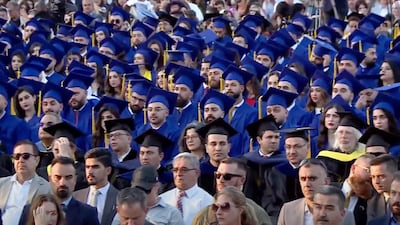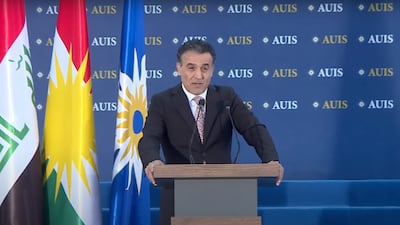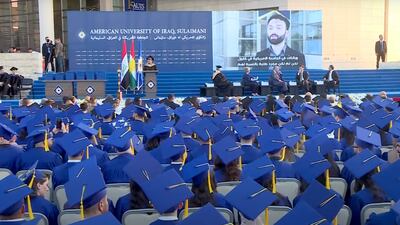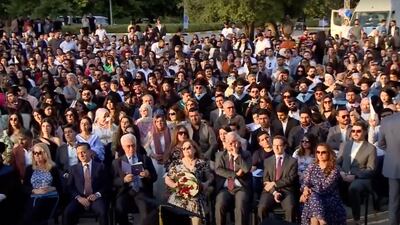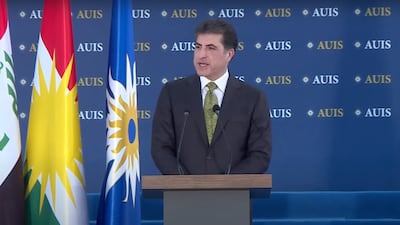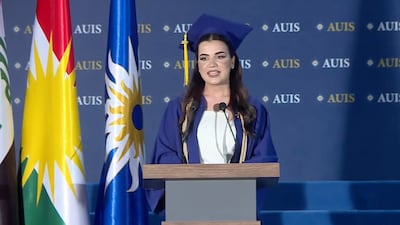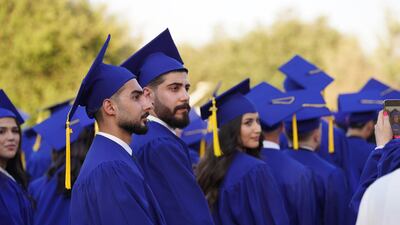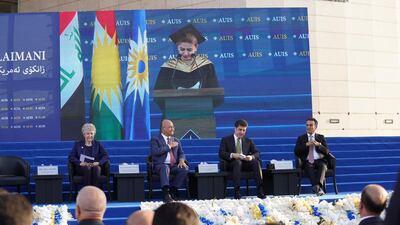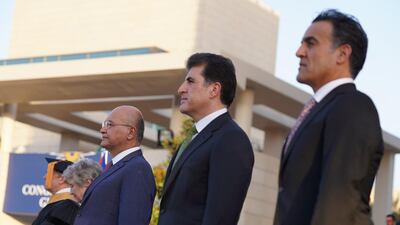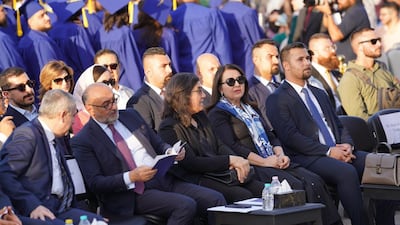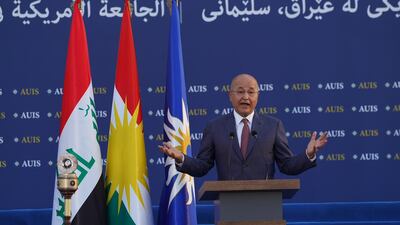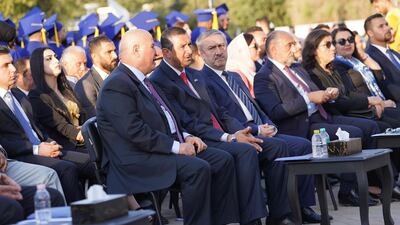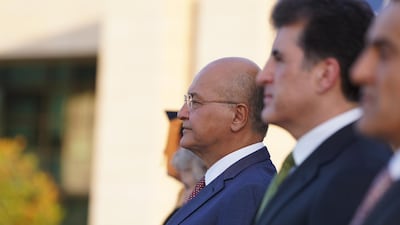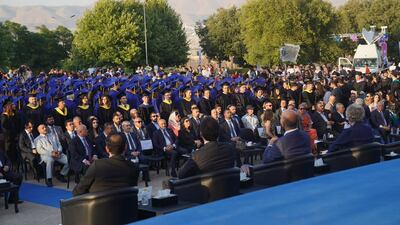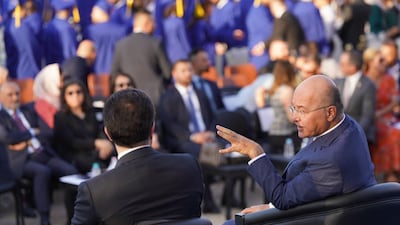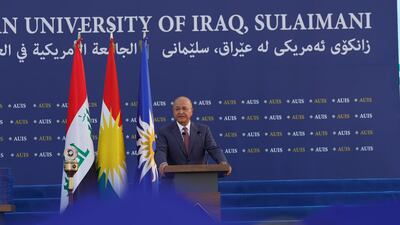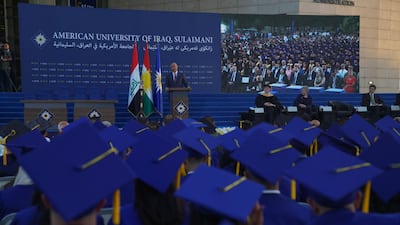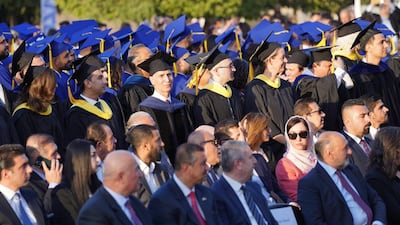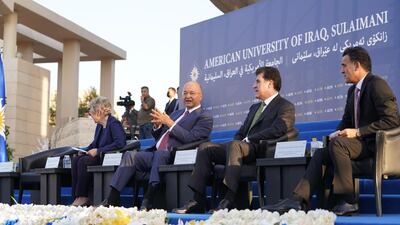In early August 2014, everything was gloomy around Eveen Ali Hassan.
Her family had only a few minutes to flee their home town of Bashiqa in northern Iraq as ISIS advanced during their onslaught that ended with controlling large areas of the country’s north and west.
“At that time, they were moving towards us after taking over Mosul and we heard they were just 10 minutes away from us,” Ms Hassan, who was 17 at the time, told The National on Thursday.
She recalled the afternoon journey she took with her mother, two brothers and two sisters. “We picked up only our IDs and jumped into my uncle’s car heading nowhere in particular — only to save our lives."
Then, the family joined millions of Iraqis who were uprooted from their home towns, an experience that left her suffering from deep depression and anxiety. She couldn’t imagine what their life would look like in the future.
But nearly eight years later, Ms Hassan stood on stage of the American University of Iraq in Sulaimaniya during a commencement ceremony as a Valedictorian with an inspiring story to tell.
ISIS nightmare
Before taking over Bashiqa, one of many small towns that make up the ethnically and religiously mixed Nineveh Plain, news reached Ms Hassan’s family about the militant group's genocide of the Yazidi minority in the nearby town of Sinjar.
Then, ISIS fanatics took thousands of Yazidis captive from Sinjar and surrounded areas and slaughtered others. Yazidis follow an ancient monotheistic religion but are falsely seen by some as devil-worshippers.
Thousands of young women were forced into sexual slavery by the militants, while mass graves containing the bodies of thousands killed are still being uncovered.
After taking the road north, the family settled in the city of Dahuk only to leave a month later due to high rents.
“Again, we had nowhere to go and we had to sleep two nights inside the car until we were offered an unfinished house in a village outside Mosul to live,” said Ms Hassan, now 24.
A week later as ISIS approached, they fled again and headed further north in a bid to cross the border to Turkey only to find they had no passports.
“It was one of the worst experiences I've ever had in my life, especially when we heard what they did to the Yazidis in Sinjar,” she said.
“I remember how my mum was afraid and nervous but she didn’t want us to get that feeling ... she was trying to comfort us."
Later, the family managed to settle in Erbil, the capital of the northern Kurdish region, where Ms Hassan continued her studies and her mother and brother secured jobs.
After graduating from high school with the highest marks, she won a scholarship from the US embassy to study business administration at AUIS.
At Wednesday’s ceremony, she delivered a message, one that “says no matter who we are, where we come from, what our religion is or what our cultural backgrounds are, we still can work together to achieve greatness and make this country proud of us”.
“We all know what this country has been through, each one of us has been affected in one way or another, some have lost their loved ones, others have been through hard financial times, some have lost their jobs and faced hungry and poverty," she said.
“I know it was hard for some of us to keep studying and continuing our education, yet we did it and we all here graduating today."
The audience hung on her every word as she described the ordeal.
“Like most of you I have been fighting for my dreams every day and look where I am today,” she told the audience, who burst into applause.
“So we must always remember how strong we are to have overcome all this.”
As Iraq was engulfed by sectarian fighting and political wrangling, AUIS opened its doors in 2007 to become one of the most prestigious universities in the country and a rare success story in the war-ravaged country.
At the onset, it received 10 students from across Iraq to the first undergraduate class. The university simultaneously launched a professional MBA programme for students planning to study business and leadership at graduate level.
Since then, its roll has grown to about 1,600 students and it now offers undergraduate degrees in business administration, information technology, international studies, engineering and English and journalism.
This year, it turned 15 and the cohort that graduated is the 11th.
“This was a long, long shot for many that we could ever have an American University in Sulaimaniya at the time,” Iraqi President Barham Salih, the founder of AUIS, told the graduates.
Mr Salih described the establishment of a high-standard university as a “dream" he had nurtured for many years.
Mina Al-Oraibi, Editor-in-Chief of The National and member of the university's Board of Trustees said in her commencement address to the graduates: “History casts a long shadow of both achievement and disappointment over our country.
“These lands have seen some of the best of men and women, but also some of the worst brutality mankind can inflict on one another.
“This university is a testament to the best of what men and women can create, seeking education, community and enlightenment."
Afghan refugees continue education
Wednesday’s commencement ceremony also featured a cohort from another war-torn nation.
Thirty-two Afghan students were among about 100 other students from the American University in Afghanistan, who joined classes late last year after the Taliban takeover.
Among them was Ajmal Wafa, who studied business administration.
Before the fall of Kabul in August, Mr Wafa had “a very good life, but all of the achievements got destroyed, faded and vanished in a second”.
Continuing to live there was like a “suicide mission for me”, he told The National.
In 2016, the Taliban attacked the American University in Afghanistan, killing at least 16 of his colleagues. Some of the professors were kidnapped by the hard-line militants and were released only after ransoms were paid.
When the Taliban entered Kabul in August, they attacked it again so “it became very clear to us how significant this university for them”, Mr Wafa said.
They labelled the university as the place “where spies of the US are trained”.
One of Mr Wafa's female colleagues was shot at a security checkpoint manned by Taliban members.
“It was very clear that you became a target and we had to constantly change our locations because our data basis, our phone numbers and our locations were there,” he said.
“It was risky to stay in one place so we sometimes had to go to friends’ or relatives’ homes."
Like many others, he considers himself lucky to have left Kabul.
Joining AUIS in Sulaimanya late last year was “a life-changing moment for me, I not only survived but also continued my education”, Mr Wafa said.
For him, “the future is still uncertain” and he is still considering whether to stay in Iraq to continue his education or to go abroad — but not Afghanistan.
The presence of the Afghan student made the commencement ceremony a special one, president of AUIS Bruce Ferguson told The National.
The two universities celebrated "the fact that Afghan students were able to graduate", said Mr Ferguson who was a professor at Masdar Institute in Abu Dhabi before joining AUIS.
"A year ago they didn’t know where they would be and whether to they would be able to complete their education," he said.
The university president said everyone was happy to see each other in person and to have an in-campus commencement ceremony after lockdowns caused by the pandemic.
